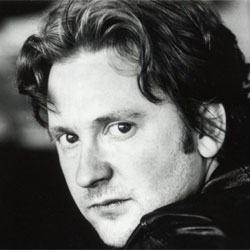My clock has gone although the sun has yet to take the sky.
I thought I was the first to see the snow, but his old eyes
have marked it all before I catch him in his column of light:
a rolled up metal shutter-blind, a paper bale held tight
between his knees so he can bring his blade up through the twine,
and through his little sacrifice he frees the day’s headlines:
its strikes and wars, the weather’s big seize up, runs on the pound.
One final star still burns above my head without a sound
as I set off. The dark country I grew up in has gone.
Ten thousand unseen dawns will settle softly on this one.
But with the streets all hushed I take the papers on my round
into the gathering blue, wearing my luminous armband.
Notes on the Poem
"The Newsagent", a deceptively understated poem by Paul Farley, juxtaposes small, simple images and gestures against movements, activities and influences much broader in scope and implication. Doing so, what does Farley achieve in the poem's economical 12 lines? The narrator's alarm clock opens the poem, waking him before sunrise. That the narrator is forced to rise so early suggests a demanding, menial, unnoticed and unappreciated vocation, but that plain declaration also has an element of pride to it. Not only does the narrator choose to be up before dawn, but it's almost as if he and his clock purposefully have the jump on the sun. While the narrator convinces himself he can beat the sun, he also observes that it's his employer's actions that unleash the news. When the newsagent snips the binding around the newspapers, that brings forth the world's "strikes and wars, the weather's big seize up, runs on the pound." The conundrum is that what the newsagent is setting free are forces that the narrator surely doesn't welcome. If he has control, why isn't he releasing wonderful and benevolent things? But the narrator doesn't allow himself to get dismayed. He picks up his papers, that cascade of woe unbundled by the newsagent, and makes his way out on his rounds. The changing colour of the sky hints that the sun will rise for another day. Till it does, the narrator's armband offers illumination. From a dimly lit, perhaps bleak opening, has Farley left us with some defiant optimism after a mere and modest 12 lines?
